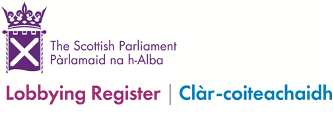The Lobbying (Scotland) Act 2016 and what it means for your charity
Tuesday December 5, 2017

Following considerable scrutiny and debate, the Lobbying (Scotland) Act 2016 became law in April 2016. That debate recognised lobbying as a legitimate and valuable part of our democratic process, whilst agreeing that the creation of a public Lobbying Register was appropriate to enhance public transparency, for certain types of lobbying.
The Scottish Parliament was given the duty to develop and implement the systems and guidance to operate the new Lobbying Register and committed to do so within 2 years of the Act being passed.
Dougie Wands, Acting Lobbying Registrar, summarises what to expect for those involved in face-to-face lobbying of MSPs, members of the Scottish Government, junior Ministers, Special Advisers or Permanent Secretary.
To assess whether the Act will impact on your charity, it’s crucial to know what “forms” of lobbying it applies to. The Act creates a definition of regulated lobbying and only instances of regulated lobbying will require to be recorded on the new Lobbying Register.
Parliamentary Guidance has been developed in conjunction with the Lobbying Register Working Group, a key group of representatives from business, public relations, third sector organisations, key representative bodies and individuals from the legal sector, the pro-transparency community and journalism.
And it is within the Parliamentary Guidance you will find our Key Steps (more at www.parliament.scot/lobbying). The 5 Key Steps help to describe concisely what regulated lobbying is. If any of the following 5 Key Steps don’t apply to your circumstances then you will not be engaged in regulated lobbying.
Step 1 makes clear that regulated lobbying applies to oral communications (plus use of sign language); and only those which are made face-to-face (including by video conference) with MSPs, members of the Scottish Government (including Scottish Law Officers – the Lord Advocate and the Solicitor General), junior Ministers, Special Advisers or Permanent Secretary.
Regulated lobbying does not apply to any other types of communication, such as emails, letters, tweets, phone calls, etc.
Step 2 sets out that regulated lobbying only applies to communications made regarding Scottish Government or Scottish Parliament functions.
Significantly, there is no exclusion to where or when regulated lobbying can take place. That means it is possible that regulated lobbying could take place anywhere and at any time and not just in formal situations when you meet any of the individuals listed above.
In some of these less formal situations, a conversation may well not develop into a discussion which would be regulated lobbying, however, if you choose to use this opportunity to lobby, you should keep in mind that any discussion can count, regardless of where it takes place. With regulated lobbying it is the content of the conversation you have that counts.
Of course, that conversation has to concern Scottish Government or Scottish Parliament functions and you would also be using the opportunity to inform or influence decisions on behalf of your charity, or those charities you represent. That’s acknowledged in our Step 3.
Importantly, you also have to be paid in some capacity, which is set out as Step 4. That means payment in the widest context – not just payment for a particular piece of lobbying. So, if your charity (or those you represent) pays you a salary or provides other forms of payment, then that will count too.
Step 5 explains that even if your communication matches all four previous steps, there are 13 exemptions in the Act, covering a wide range of circumstances and organisational status. As such, a large part of the Parliamentary Guidance is committed to explaining the exemptions in more detail, so you can make a considered decision about whether the lobbying activities you engage in are actually regulated lobbying.
On 23 October 2017 the Lobbying Register Team at the Scottish Parliament announced the launch of a familiarisation period that will run until February 2018. The website is available at www.lobbying.scot, where you will also find a video by Billy McLaren, introducing the Scottish Lobbying Register. You can register on the site and submit mock returns, as well read the parliamentary guidance in order to prepare your organisation for the Act being fully commenced.
With all of this, the Lobbying Register Team will be on hand to help. Register with us at lobbying@parliament.scot to receive our regular e-bulletins and keep up-to-date with all developments as we move towards our formal launch next year.
